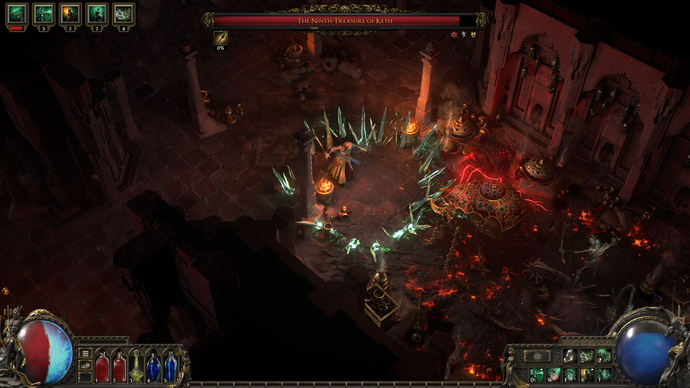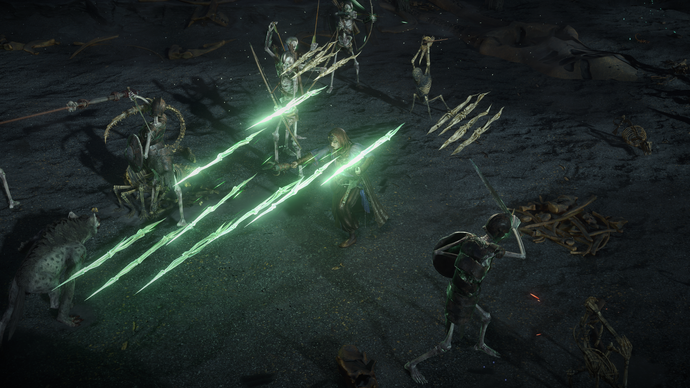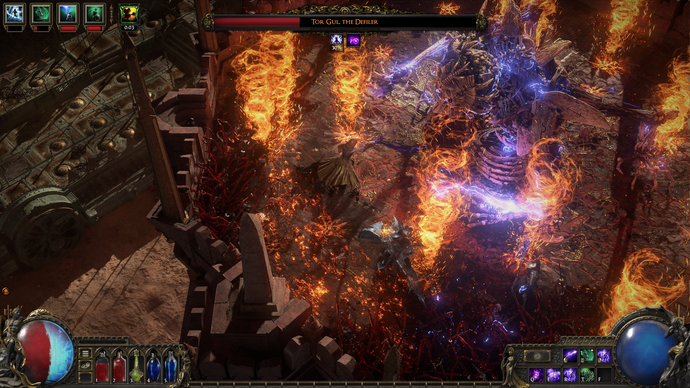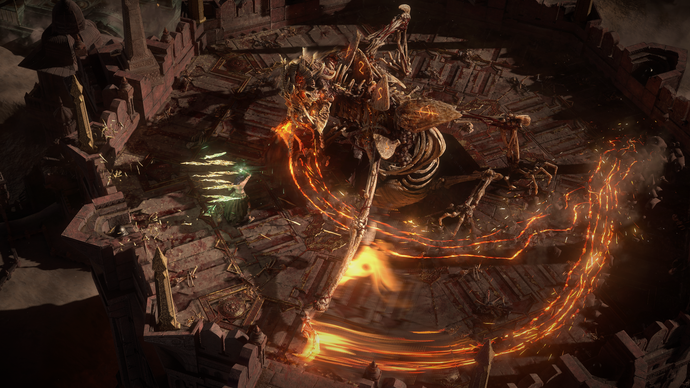It’s important to understand that before I got my hands on Path of Exile 2 I had been travelling for 15 straight hours, including a long plane delay and then an aborted landing attempt that made me genuinely fear that I was going to feature in the next Boeing horror story. As a newcomer to what will soon be the Path of Exile series, I was already daunted by its famous complexity. Compounded with stress and sleeplessness, I was starting to worry that I might not be able to get a footing at all, and find myself completely adrift.
But within a few minutes of picking up the controller, I realised I was relaxed. I had been deftly onboarded, and, despite the chaos of the day, figuring out what loot and passives I wanted to use to pick my way through rotted wolves, crawling forest imps, and fleshy underground slugs was unwinding, not intimidating.
“[Path of Exile 2] should certainly be a lot easier to get into,” says game director Jonathan Rogers, although he stresses that this isn’t at the expense of potential depth for your character once you get the hang of things (or if you’re a long term player coming from Path of Exile 1). The key, he says, is that actions like equipping new abilities are streamlined, and the opening areas are designed so that you will run into key tutorial aspects no matter what you choose to do first.
In early playtests, for example, “a lot of people…didn’t happen to get good RNG for the item drops, or they kind of picked the wrong skill…and they didn’t end up having a good time,” says Rogers. In more recent builds, things are nudged so that you should be able to learn the ropes and get your character at least powerful enough to survive. “All that stuff requires a lot of very subtle massaging of things to get it right,” says Rogers.
From my experience, the massaging has done its job. The preview I played had a new class available, the Witch, who can fire off all kinds of elemental attacks with dual-wielded wands, as well as summoning minions to take on enemies for you. It felt methodical, with the new dodge roll as well as the Witch’s minion summoning and spellcasting favouring a slower approach. And this slower pace across the sequel was echoed by Rogers, who says it wasn’t necessarily “the intention” but “part of the process of making the combat feel good.”


Part of this move to the combat feeling “good” is making it tougher, says Rogers. For example, dying now means restarting at a checkpoint, so losses are more keenly felt – or, as he puts it, “it makes you actually have to care a lot more about what’s going on.” That naturally leads to slowing down, and even “running away more.”
Rogers says that he “wasn’t really very happy with the way that especially melee combat was,” in Path of Exile 1. In part, this was because of limitations with the animation system, which uses rigs built in 2006. “Every time you need to make a new character animation, all of our characters had different rigs, which meant that you had to redo it seven times,” he says, plus more variations for weapon types and so on. “It was just a whole hassle. No one wanted to make new animations for our classes.”
He says that making new, easier to work with rigs was a big part of what pushed Grinding Gear Games towards the full sequel treatment for Path of Exile 2, even though it was originally conceptualised as an expansion. Trying to tie the two together “was just handcuffing us when it comes to what kind of changes we could make,” says Rogers. He says it was actually small things that broke the camel’s back, so to speak. Big changes “sound like exciting new features,” but something like telling players that energy shields would work slightly differently might make them “lose their mind” as it impacts specific builds players have come to love.
But the developers are committed to keeping both games running concurrently. “They’re going to be two games that our studio is working on at the same time,” says Rogers. He admits that “it could be tricky,” particularly for himself and game director Mark Roberts, who will split their time between the games. But other than these two and the live operations team, separate teams within the studio will look after each game, and some of the developers currently working on Path of Exile 2 will be able to shift back to Path of Exile 1 to even the numbers out again.
Seasons will be staggered between the two games, and remain a key part of how Rogers and the team conceptualise their loot-centric end-game. “I think the important thing – and I think actually a lot of games don’t get this right – [is that] you need to understand that when you have seasons, the goal is not to keep people playing the whole season,” he says. Instead, they should leave when they’re “sick of it.” Losing players across a season is actually desirable, “because when they come back they’ll be fresh.”
That’s still the goal with Path of Exile 2, and Rogers thinks that it works even better in the modern space than it did when the original game released more than a decade ago. “There’s more room in the market for games like this than there were back in the subscription, MMO days, where if that was the game you were playing, it was the only game you were playing and you didn’t want to do anything else. [Now] it’s like, I’m going to play this for a week, two weeks [and then] go away, play some other stuff.”
Dropping in and out ought to be made easier by the simultaneous releases and crossplay on PC, Xbox Series X/S, and Playstation 5 releases (the preview was carried out on a PS5 build of the game). The various platforms also support local co-op, which came with its own logistical challenges. “It’s two players on one console only, but you can still play in a party with other people so you can have up to six players in one party,” says Rogers.


Technically, he says, the only thing stopping them from having four players on one console is UI issues. “When we started, we really thought we’d be able to kind of use the same UI for both co-op and not co-op,” he says, with one player at a time doing their inventory management. “But in practice we found immediately people were like, ‘oh, it’s so annoying that I have to wait for my friend.'” So now inventory, skill assignments, and shopping can be done simultaneously, but co-op can only be played with two people on one console.
After talking to Rogers, I went back to play more of the first act, ending up in a winding underground warren, cautiously experimenting with ranged attacks and dodging back around corners when there were too many gelatinous flesh beasts to deal with. I have no doubt that there will be builds that speed through areas like this, but for me the relaxed pace was exactly what I needed.
